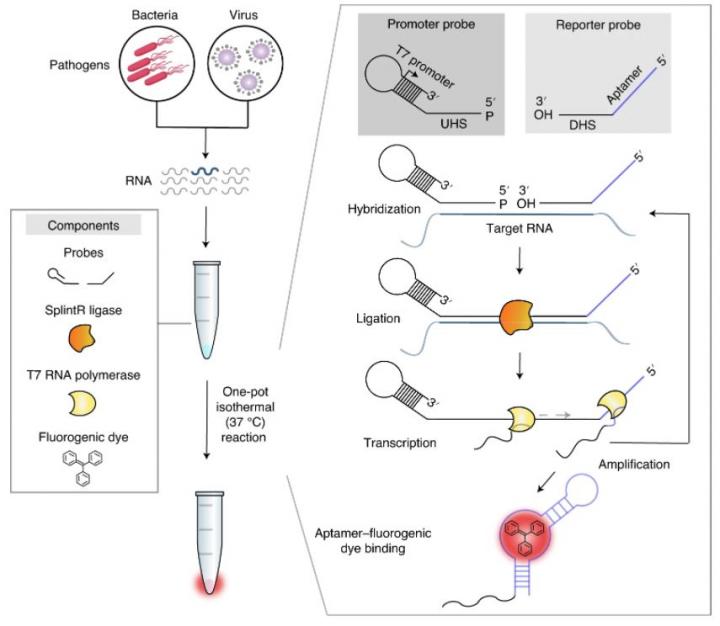
Credit: POSTECH
The year 2020 can be summarized simply by one word – COVID-19 – as it was the culprit that froze the entire world. For more than 8 months so far, movement between nations has been paralyzed all because there are no means to prevent or treat the virus and the diagnosis takes long.
In Korea, there are many confirmed cases among those arriving from abroad but diagnosis does not take place at the airport currently. Overseas visitors can enter the country if they show no symptoms and must visit the screening clinic nearest to their site of self-isolation on their own. Even this, when the clinic closes, they have no choice but to visit it the next day. Naturally, there have been concerns of them leaving the isolation facilities. What if there was a way to diagnose and identify the infected patients right at the airport?
A joint research team comprised of Professor Jeong Wook Lee and Ph.D. candidate Chang Ha Woo and Professor Gyoo Yeol Jung and Dr. Sungho Jang of the Department of Chemical Engineering at POSTECH have together developed a SENSR (SENsitive Splint-based one-pot isothermal RNA detection) technology that allows anyone to easily and quickly diagnose COVID-19 based on the RNA sequence of the virus.
This technology can diagnose infections in just 30 minutes, reducing the stress on one single testing location and avoiding contact with infected patients as much as possible. The biggest benefit is that a diagnostic kit can be developed within week even if a new infectious disease appears other than COVID-19.
The PCR molecular test currently used for COVID-19 diagnosis has very high accuracy but entails a complex preparation process to extract or refine the virus. It is not suitable for use in small farming or fishing villages, or airport or drive-thru screening clinics as it requires expensive equipment as well as skilled experts.
RNA is a nucleic acid that mediates genetic information or is involved in controlling the expression of genes. The POSTECH researchers designed the test kit to produce nucleic acid binding reaction to show fluorescence only when COVID-19 RNA is present. Therefore, the virus can be detected immediately without any preparation process with high sensitivity in a short time. And it is as accurate as the current PCR diagnostic method.
Using this technology, the research team found the SARS-CoV-2 virus RNA, the cause of COVID-19, from an actual patient sample in about 30 minutes. In addition, five pathogenic viruses and bacterial RNAs were detected which proved the kit’s usability in detecting pathogens other than COVID-19.
Another great advantage of the SENSR technology is the ease of creating the diagnostic device that can be developed into a simple portable and easy-to-use form.
If this method is introduced, it not only allows onsite diagnosis before going to the screening clinic or being hospitalized, but also allows for a more proactive response to COVID-19 by supplementing the current centralized diagnostic system.
“This method is a fast and simple diagnostic technology which can accurately analyze the RNA without having to treat a patient’s sample,” commented Professor Jeong Wook Lee. “We can better prepare for future epidemics as we can design and produce a diagnostic kit for new infectious diseases within a week”
Professor Gyoo Yeol Jung added, “The fact that pathogenic RNAs can be detected with high accuracy and sensitivity, and that it can be diagnosed on the spot is drawing attention from academia as well as industry circles.” He explained, “We hope to contribute to our response to COVID-19 by enhancing the current testing system.
###
The study, which was published in Nature Biomedical Engineering on September 18 (KST), was conducted with the support from the National Research Foundation’s C1 Gas Refinery Program and New Research Program, and by the Industry Specialist Training Program from the Korea Institute of Energy Technology Evaluation and Planning.
Media Contact
Jinyoung Huh
[email protected]
Original Source
http://postech.
Related Journal Article
http://dx.




